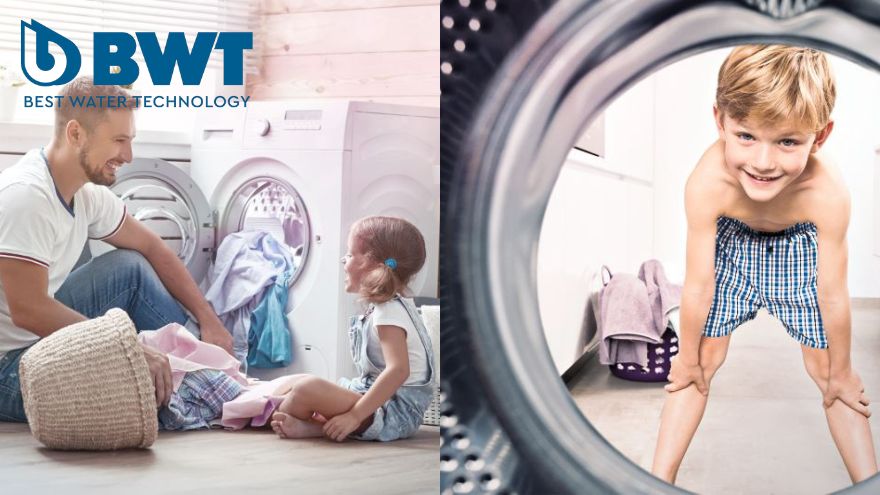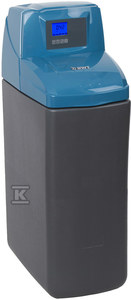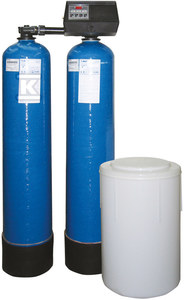The washing machine is only a few years old... and it no longer works? Often it is not the fault of technology or method of use, but of the water flowing in the pipes. We explain how water with a high calcium content can damage household appliances such as washing machines, dishwashers or radiators , and how to avoid costly repairs in the future.

From this article you will learn:
- what causes water hardness,
- what impact does it have on water installations and household appliances,
- how to prevent problems caused by hard water.
Hard water – a source of problems
Thousands of liters of water flow through the pipes of a residential building's water system every day. If this water is hard, it can cause many problems. Hard water has a high content of scale-forming substances - the harder the water, the more calcareous it is. According to calculations by BWT , approximately 60 kg of calcium flows through the water system of an average single-family house every year. When even a small part of it settles in the pipes, it may clog them and cause scale formation of household appliances connected to the water system. All this has costly consequences.
Possible effects of calcium on pipes and equipment:
- increased energy consumption and therefore higher expenses;
- workload and costs associated with descaling washing machines, dishwashers and other devices;
- premature wear and tear of household appliances and the resulting repair costs;
- complete failure of household or sanitary appliances and replacement costs running into thousands of zlotys.
Check out the full range of BWT water treatment products
Calcium provides germs with excellent conditions for development

Not only household appliances can be damaged by limescale. Lime deposits in hot water pipelines are an ideal breeding ground for bacteria such as legionella. A humid, warm environment is especially favorable for their multiplication. If bacteria are detected in drinking water, the entire water system must be disinfected and, if necessary, rebuilt to prevent further microbial attack. Long-term protection against scale also helps prevent the development of bacterial flora and saves a lot of money.
Choose a water softener and protect your household appliances against premature wear
To protect pipes and devices against scale build-up, it is recommended to soften the water. In the ion exchange process, water softeners such as BWT systems react with substances that affect water hardness and replace them with sodium ions. In this way , hard water turns into silky soft and pearly water, which protects home appliances from premature wear caused by limescale deposits and thus extends their service life.
Water softening reduces energy costs
Water softening systems not only extend the life of household appliances, but also contribute to increasing their efficiency and energy efficiency. This is especially true in the case of water-heating devices, such as boilers or washing machines. This happens because the scale reduces heat conduction and is deposited primarily - ironically - in places that are its transmitters. The washing machine heater or the heat exchanger of the heating boiler are therefore real "magnets" attracting lime deposits.
Impeded heat conduction, of course, translates into increased energy consumption. Even a two-millimeter layer of scale on the heating element of a boiler or heat exchanger can increase energy consumption by up to 20 percent . Soft water has a low calcium content and allows heating devices to operate more efficiently, which is also good for the environment.
Which water softener should you choose?
 Now that we know what the consequences of deposits in water installations and household appliances can be and how to counteract them, it's time to present some specific solutions :
Now that we know what the consequences of deposits in water installations and household appliances can be and how to counteract them, it's time to present some specific solutions :
- Soften single-column BWT RONDOMAT 29 NXT 1450 – single-column softener with an electronic controller for cold water. It allows the supply of both fully and partially softened water using an additional water hardness adjustment valve. Made of the highest quality materials, resistant to corrosion, ensuring durability and failure-free operation of the device. Insensitive to interference caused by periodic voltage failures. Ion exchangers filled with certified, high-performance, long-life ion exchange resin. PZH certificate.
- BWT EUROSOFT E91 DWZ 40 SXT double-column softener – a two-column electronically controlled volume softener, operating in a swing system. Ensures uninterrupted water supply. It allows the supply of both fully and partially softened water. The compact design allows installation even in small rooms. Made of the highest quality materials, insensitive to interference caused by periodic lack of voltage. Ion exchangers filled with certified, high-performance, long-life ion exchange resin. PZH certificate.
- BWT AQUADIAL 25 water treatment station - a single-column volume-controlled softener, designed especially for homes and commercial facilities. Factory programmed for easy commissioning. The device is equipped with a multi-way microprocessor control valve with proportional bed regeneration, a mixing valve for hardness regulation, an ion exchange column, an overflow elbow, a rinsing water hose and a tablet general hardness tester. With PZH certificate.